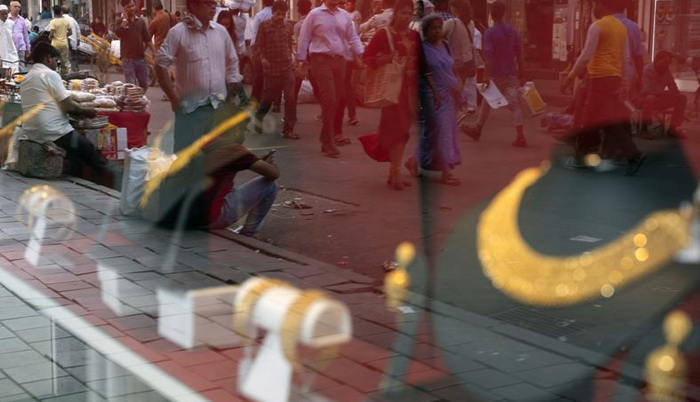![]() Home > World Business
Home > World Business
Plunging Rupee Pushes India To Raise Taxes On Gold, Oil

Jewelry on display in a window of a store in Zaveri Bazaar, Mumbai.Photographer: Kanishka Sonthalia | Bloomberg
![]() July 1st, 2022 | 14:33 PM |
July 1st, 2022 | 14:33 PM | ![]() 445 views
445 views
INDIA
India tightened exports of oil and imports of gold in an all-out effort to rein in the rupee that plunged to a fresh record Friday.
The administration raised import taxes on gold, while increasing levies on exports of gasoline and diesel as it sought to control a fast-widening currency deficit. The measures sent Reliance Industries Ltd. and other energy exporters tumbling, bringing down the benchmark index by as much as 1.7%. The currency fell again.
The rupee has tested a series of record lows, underscoring the economic challenges faced by Prime Minister Narendra Modi’s government as inflation accelerates and external finances worsen. The central bank has been battling to slow the currency’s decline, and runaway rupee depreciation will worsen price pressures, and may spur more rate hikes that weigh on growth.
“The biggest near term challenge for policymakers is to anchor inflationary expectation” said Upasna Bhardwaj, chief economist at Kotak Mahindra Bank. “Inflationary pressures would not subside without adequate fiscal response in tandem with monetary tightening.”
A shortfall in India’s current account -- the broadest measure of trade -- will probably widen to 2.9% of gross domestic product in the fiscal year ending March 31, according to a Bloomberg survey in late June, nearly double the level seen in the previous year.
While the Reserve Bank of India has been seeking to smooth out the currency’s decline, banks have reported dollar shortages as everybody from investors to companies rushed to swap the rupee. The currency has fallen 6% this year against the dollar, as rate hikes by the Federal Reserve pulled capital from developing markets.
Policy makers in many emerging markets all face stark choices: forcefully raise borrowing costs to defend currencies and risk hurting growth, spend reserves that took years to build to intervene in foreign exchange markets, or simply step away and let the market run its course.
“The biggest near term challenge for policymakers is to anchor inflationary expectation” said Upasna Bhardwaj, chief economist at Kotak Mahindra Bank. “Inflationary pressures would not subside without adequate fiscal response in tandem with monetary tightening.”
A shortfall in India’s current account -- the broadest measure of trade -- will probably widen to 2.9% of gross domestic product in the fiscal year ending March 31, according to a Bloomberg survey in late June, nearly double the level seen in the previous year.
While the Reserve Bank of India has been seeking to smooth out the currency’s decline, banks have reported dollar shortages as everybody from investors to companies rushed to swap the rupee. The currency has fallen 6% this year against the dollar, as rate hikes by the Federal Reserve pulled capital from developing markets.
Policy makers in many emerging markets all face stark choices: forcefully raise borrowing costs to defend currencies and risk hurting growth, spend reserves that took years to build to intervene in foreign exchange markets, or simply step away and let the market run its course.
Source:
courtesy of BLOOMBERG
by Ronojoy Mazumdar and Swansy Afonso
If you have any stories or news that you would like to share with the global online community, please feel free to share it with us by contacting us directly at [email protected]